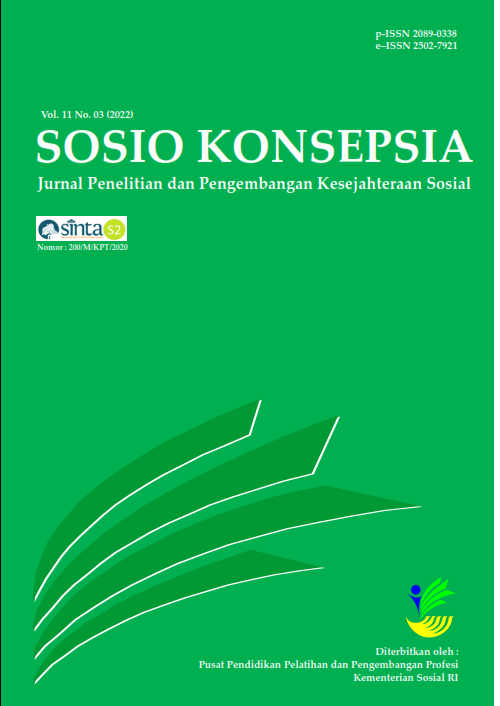Community Organizing of Victims of Human Trafficking in Kulon Progo: Road to An Integrated Approach Against Oppression
Published 2023-01-10
Keywords
- human trafficking, oppression, victim, community organizing, integrated approach
How to Cite
Copyright (c) 2023 Sri Widayanti

This work is licensed under a Creative Commons Attribution-NonCommercial-ShareAlike 4.0 International License.
Abstract
The discourse on human trafficking and the efforts to overcome it are crucial issues that has received public attention in Indonesia and all around the globe. However, different perspectives among experts, activists and organizations gave rise to different approaches in analyzing the source of the problem, what is seen as the problem, and the intervention to solve the problem. This research focuses on community organizing of women victims of human trafficking as the approach which has been implemented to challenge oppression by Mitra Wacana Women Resource Center in Kabupaten Kulon Progo, Daerah Istimewa Yogyakarta. This qualitative study is aimed to explore their perspectives on defining human trafficking and its complexities, their analysis of its causes and the intervention method. The theory of anti-oppressive is applied to analyze the data and findings within this research, which results in three main points; first, Mitra Wacana’s critical awareness raises a comprehensive perspective on the complexity of the human trafficking issue by identifying the community as victims of a discriminatory and exploitative system. Second, organizing ex-migrant workers in Pusat Pembelajaran Perempuan dan Anak/P3A (Learning Center for Women and Children) is applied as the approach to strengthen rights-based capacity for the Kulon Progo community. Third, an integrated approach against oppression within human trafficking tried to synergize three levels of personal, cultural and structural approach. In the case of human trafficking in Kulon Progo, the integrated approach consists of public education, information development, and policy advocacy on humanity issues by involving the organization of ex-migrant workers.
Downloads
References
- Amadasun, S. & Omorogiuwa, T.B.E. (2020). Applying Anti-Oppressive Approach to Social Work Practice in Africa: Reflections of Nigerian BSW Students. Journal of Humanities and Applied Social Sciences 2(3):197–213. doi: 10.1108/JHASS-12-2019-0082/full/html.
- Bungin, B. (2007). Penelitian Kualitatif: Komunikasi, Ekonomi, Kebijakan Publik Dan Ilmu Sosial Lainnya. Jakarta: Kencana Prenada Media Grup.
- Everd, S.C.R., Mulyana, N. & Wibhawa, B. (2017). Human Trafficking di Nusa Tenggara Timur. Share Social Work Journal vol. 7 (1). https://jurnal.unpad.ac.id/share/article/view/13808
- Fakih, M. (1996). Masyarakat Sipil Untuk Transformasi Sosial: Pergolakan Ideologi LSM Indonesia. Yogyakarta: Pustaka Pelajar.
- Fakih, M. (1996). Masyarakat Sipil Untuk Transformasi Sosial: Pergolakan Ideologi LSM Indonesia. Yogyakarta: Pustaka Pelajar.
- Farhana. (2010). Aspek Hukum Perdagangan Orang Di Indonesia. Jakarta: Sinar Grafika.
- Freire, P. (2011). Pendidikan Kaum Tertindas. 7th ed. Jakarta: LP3ES.
- Galba, S. (2013). Pesantren Sebagai Wadah Komunikasi. Renika Cipta 6(2):145–58.
- Khayati, E.Z. (2006). Trafficking Tantangan Bagi Indonesia. Musawa Jurnal Studi Gender dan Islam 4(3):381–97. doi: 10.14421/MUSAWA.2006.43.381-397.
- Kosandi, M. & Kartini, E. (2022). Human Trafficking Di Asia Tenggara: Mencari Solusi Kolektif Melalui ASEAN. (https://docplayer.info/37039974-Human-trafficking-di-asia-tenggara-mencari-solusi-kolektif-melalui-asean-meidi-kosandi-dan-evida-kartini-abstrak.html).
- Mildi, M.R.& Setiawati, S.M. (2022). Kompleksitas Penanganan Isu Perdagangan Manusia Di Indonesia Pasca Ratifikasi Actip (The ASEAN Convention Against Trafficking in Person, Especially Women and Children). (http://etd.repository.ugm.ac.id/penelitian/detail/204603).
- Mullaly, B. (1997). Challenging Oppression: A Critical Approach to Social Work. Oxford University Press.
- Mullaly, B. (2002). Structural Social Work: Ideology, Theory and Practice. Oxford University Press.
- Neuman, W. L. (2006). Social Research Methods: Qualitative and Quantitative Approaches. 6th ed. Pearson.
- Nugroho, O.C. (2018). Tanggung Jawab Negara Dalam Penanganan Tindak Pidana Perdagangan Orang. Jurnal Penelitian Hukum De Jure 18(4):543. doi: 10.30641/dejure.2018.v18.543-560.
- Patton, M. Q. (2002). Qualitative Research and Evaluation Methods. London: Sage Publication.
- Putsanra, D.P. (2017). Nasib Perempuan Gusuran Bandara YIA: Dari Petani Jadi Pengangguran", (https://tirto.id/nasib-perempuan-gusuran-bandara-yia-dari-petani-jadi-pengangguran-fhCx).
- Rahmah, D. & Apriani, F. (2018). Kebijakan Nasional Anti-Trafficking Dalam Migrasi Internasional. Jurnal Politica Dinamika Masalah Politik Dalam Negeri Dan Hubungan Internasional 8(2). doi: 10.22212/JP.V8I2.1140.
- Sekarani, R. & Natalia, M.D. (2016). Perdagangan Manusia : TKI & Kemiskinan di KulonprogoHarianjogja.Com.https://jogjapolitan.harianjogja.com/read/2016/10/28/514/764265/perdagangan-manusia-tki-kemiskinan-di-kulonprogo).
- Wahid, A. (2006). Islamku, Islam Anda, Islam Kita: Agama Masyarakat Dan Negara Demokrasi. Jakarta: The Wahid Institute.
- Widayanti, S. (2020). Pesantren and Social Empowerment: A Critical Analysis on Pesantren Al-Imdad Yogyakarta and Pesantren Maslakul Huda Central Java. Analisa: Journal of Social Science and Religion 5(01):51–70. doi: 10.18784/analisa.v5i1.1055




